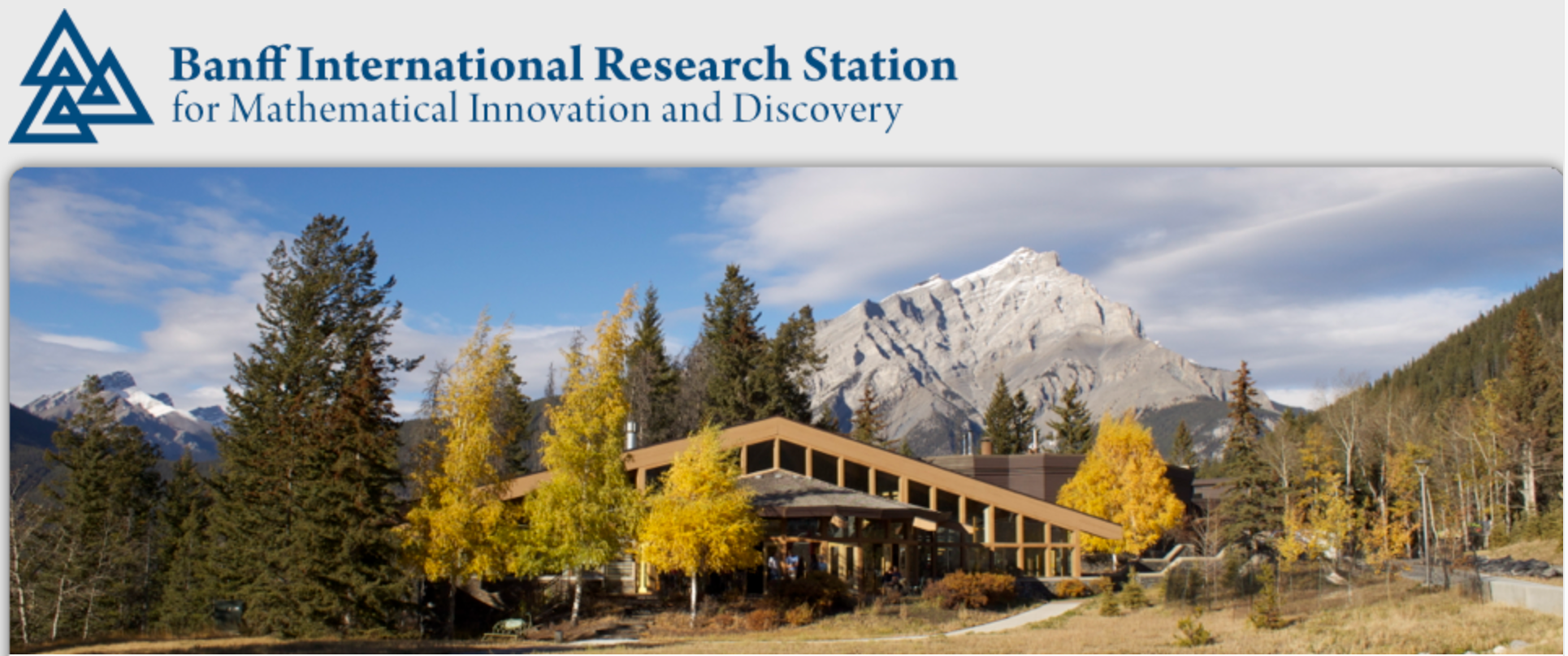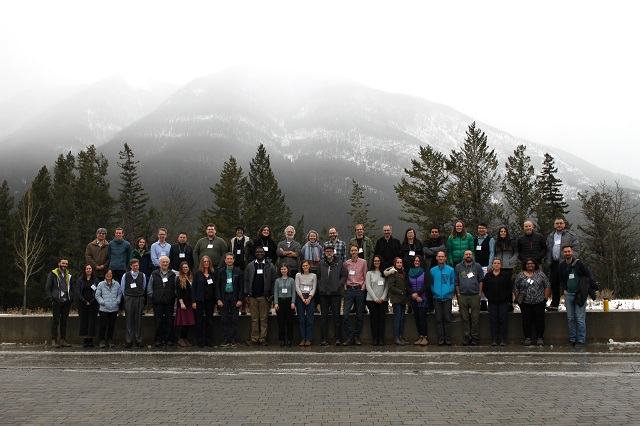23/11/12 CANMOD: Progress and Next Steps
The Banff International Research Station will host the "The Canadian Network for Modelling Infectious Diseases: Progress and Next Steps" workshop in Banff from November 12 to November 17, 2023. Organizers: David Earn (McMaster University), Caroline Colijn (Simon Fraser University), Irena Papst (Public Health Agency of Canada).

- What have we learned from the COVID-19 pandemic, and how can we be better prepared for the next global outbreak? This workshop brings together collaborative teams of modellers, statisticians, epidemiologists, genomics experts, public health decision-makers, and those implementing and delivering interventions who have been working together in a research network, aiming to increase Canada’s capacity for data-driven emerging infectious disease modelling to directly support future public health decisions.

- This BIRS meeting is an important opportunity for network members and collaborators to share the outcomes of their research over the two years since the network was launched with funding from the federal government. The questions being tackled at this workshop are grounded in public health needs and generated in partnership between research investigators and knowledge users – public health leaders, health administrators and policy-makers.
| Sunday, November 12 |
| 16:00 - 17:30 | Check-in begins at 16:00 on Sunday and is open 24 hours(Front Desk - Professional Development Centre) |
| 17:30 - 19:30 | Dinner↓(Vistas Dining Room) |
| 19:30 - 21:30 | Informal gathering↓(Other (See Description)) |
| Monday, November 13 |
| 07:00 - 08:45 | Breakfast↓(Vistas Dining Room) |
| 08:45 - 09:00 | Introduction and Welcome by BIRS Staff↓(TCPL 201) |
| 09:00 - 09:30 | David Price: The CANMOD/EIDM Knowledge Graph(TCPL 201) |
| 09:30 - 10:00 | Kevin Brown: Association between Late Outbreak Identification and SARS-CoV-2 Infection and Mortality Among Nursing Home Residents in Ontario, Canada(TCPL 201) |
| 10:00 - 10:30 | Coffee Break(TCPL Foyer) |
| 10:30 - 11:00 | Michael Li: The need to evaluate existing data resources and knowledge gaps to support future needs for respiratory disease surveillance and modelling(TCPL 201) |
| 11:00 - 11:30 | Amy Hurford: How to do modelling to support regions implementing an elimination strategy during a pandemic(TCPL 201) |
| 11:30 - 13:00 | Lunch↓(Vistas Dining Room) |
| 13:00 - 13:30 | Marie (Betsy) Varughese: The Decision Uncertainty Toolkit(TCPL 201) |
| 13:30 - 14:00 | David Champredon: Academic collaborations to improve wastewater-based modelling at PHAC(TCPL 201) |
| 14:00 - 14:20 | Group Photo↓(TCPL Foyer) |
| 14:20 - 15:00 | Steve Walker: Demo of historical infectious disease data portal(TCPL 201) |
| 15:00 - 15:30 | Evan Mitchell: Infections, hospitalizations, and deaths prevented by COVID-19 vaccines in Canada(TCPL 201) |
| 15:30 - 16:00 | Coffee Break(TCPL Foyer) |
| 16:00 - 16:30 | Étienne Racine: Dynamic transmission model for COVID-19 vaccination policy evaluation(TCPL 201) |
| 16:30 - 17:00 | Junling Ma: Evaluating the effectiveness of contact tracing in Toronto during the early stage of the COVID-19 pandemic(TCPL 201) |
| 17:00 - 17:30 | Jesse Shapiro: Transmission, adaptation, and within-host diversity of SARS-CoV-2 across animal species(TCPL 201) |
| 18:00 - 19:30 | Dinner↓(Vistas Dining Room) |
| 19:30 - 20:30 | Informal gathering(TCPL Foyer) |
| Tuesday, November 14 |
| 07:00 - 08:45 | Breakfast↓(Vistas Dining Room) |
| 09:00 - 10:00 | Caroline Colijn: Surveillance roundtable (part 1)(TCPL 201) |
| 10:00 - 10:30 | Coffee Break(TCPL Foyer) |
| 10:00 - 11:00 | Kevin Brown: Surveillance roundtable (part 2)(TCPL 201) |
| 11:30 - 13:00 | Lunch↓(Vistas Dining Room) |
| 13:00 - 13:30 | Mikael Jagan: Estimating phenomenological epidemic models with mixed effects(TCPL 201) |
| 13:30 - 14:00 | Nathaniel Osgood: Compositional Modeling: Applied Category Theory in Support of Mathematical & Computational Epidemiology(TCPL 201) |
| 14:00 - 15:00 | Steve Walker: Introduction to epidemic modelling with the `macpan2` R package(TCPL 202) |
| 15:00 - 15:30 | Coffee Break(TCPL Foyer) |
| 15:30 - 17:30 | Irena Papst: Hands on with `macpan2` and the historical infectious disease data portal(TCPL 201) |
| 17:30 - 19:30 | Dinner↓(Vistas Dining Room) |
| 19:30 - 20:30 | Informal gathering(TCPL Foyer) |
| Wednesday, November 15 |
| 07:00 - 08:45 | Breakfast↓(Vistas Dining Room) |
| 09:00 - 09:30 | Rebecca Claire Tyson: Opinion dynamics: Mechanisms for multiple epidemic waves(TCPL 201) |
| 09:30 - 10:00 | Azadeh Aghaeeyan: Revealing the unseen: What portion of the Americans relied on others’ satisfaction when deciding to take the COVID-19 vaccination(TCPL 201) |
| 10:00 - 10:30 | Coffee Break(TCPL Foyer) |
| 10:30 - 11:00 | Jenna Mee: Investigating the Impacts of COVID-19 on the Vulnerable Population using Agent-Based Modelling(TCPL 201) |
| 11:00 - 11:30 | Caroline Wagner: Multi-Pathogen Agent-Based Models for Disease Surveillance and Mitigation(TCPL 201) |
| 11:30 - 12:00 | Lisa Kanary: Assessing the Impact of Non-Pharmaceutical Interventions on COVID Prevalence Using A Predator-Prey Lotka-Volterra Model Approach(TCPL 201) |
| 12:00 - 13:30 | Lunch↓(Vistas Dining Room) |
| 13:30 - 17:30 | Group Hike / Free Afternoon(Banff National Park) |
| 17:30 - 19:30 | Dinner↓(Vistas Dining Room) |
| Thursday, November 16 |
| 07:00 - 08:45 | Breakfast↓(Vistas Dining Room) |
| 09:00 - 09:30 | Brian Gaas: Better modeling through chemistry: quantifying Covid vaccine hesitancy(TCPL 201) |
| 09:30 - 10:00 | Sana Naderi: Calculating population genetic metrics from wastewater sequencing data to predict SARS-CoV-2 waves(TCPL 201) |
| 10:00 - 10:30 | Coffee Break(TCPL Foyer) |
| 10:30 - 11:00 | Ben Ashby: Antigenic evolution of SARS-CoV-2 in immunocompromised hosts(TCPL 201) |
| 11:00 - 11:30 | Michael Wolfson: Toward Support for Epidemic Preparedness via Digital Twin Data(TCPL 201) |
| 11:30 - 13:00 | Lunch↓(Vistas Dining Room) |
| 13:00 - 13:30 | Lloyd Elliott: Four applications of statistics to COVID-19 modelling(TCPL 201) |
| 13:30 - 14:00 | Jonathan Dushoff: Approaches to modeling cross immunity(TCPL 201) |
| 14:00 - 14:30 | Jane Heffernan: Multiscale modelling of COVID-19 immunity(TCPL 201) |
| 14:30 - 15:00 | Coffee Break(TCPL Foyer) |
| 15:00 - 15:30 | Rob Deardon: Bayesian behavioural change epidemic models(TCPL 201) |
| 15:30 - 16:00 | Madeline Ward: Bayesian epidemic models with dynamic adherence to protective behaviour adoption(TCPL 201) |
| 16:30 - 17:00 | Julien Arino: Introductions and the stochastic phase of an epidemic(TCPL 201) |
| 17:00 - 17:30 | David Earn: Wrap up discussion(TCPL 201) |
| 17:30 - 19:30 | Dinner↓(Vistas Dining Room) |
| 19:30 - 20:30 | Informal gathering(TCPL Foyer) |
| Friday, November 17 |
| 07:00 - 08:45 | Breakfast↓(Vistas Dining Room) |
| 10:00 - 10:30 | Coffee Break(TCPL Foyer) |
| 10:30 - 11:00 | Checkout by 11AM↓(Front Desk - Professional Development Centre) |
| 12:00 - 13:30 | Lunch from 11:30 to 13:30(Vistas Dining Room) |
The Banff International Research Station for Mathematical Innovation and Discovery (BIRS) is a collaborative Canada-US-Mexico venture that provides an environment for creative interaction as well as the exchange of ideas, knowledge, and methods within the Mathematical Sciences, with related disciplines and with industry. The research station is located at The Banff Centre in Alberta and is supported by Canada's Natural Science and Engineering Research Council (NSERC), the U.S. National Science Foundation (NSF), Alberta's Advanced Education and Technology, and Mexico's Consejo Nacional de Ciencia y Tecnología (CONACYT)..
Tags: 23w5151